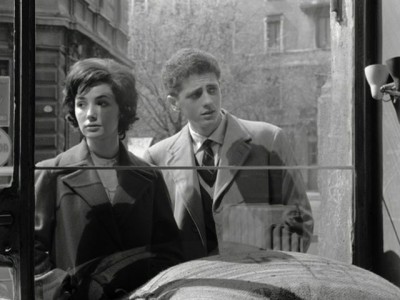
By the time Ermanno Olmi made Il Posto in 1961, the Italian neo-realist movement (born more of circumstance than a desire to change film) was pretty much a thing of the past. His choice of making a film more or less in that style, however, seems more grounded in his work as a documentarian than an adherence to the neo-realists. And his rather charming little movie sometimes feels like it owes as much to the burgeoning French New Wave than anyhing else. The story is simple. It charts the course of a young man, Domenico Cantoni (Sandro Panseri), leaving his rural home to go to the city (Milan) and secure a position (presumably for life) with a large company. That’s it. The film simply recounts that experience — and explores just what it might mean to become swallowed up by this kind of corporate “family.” In many ways, it’s a downbeat story. Most of the scenes paint a dreary picture of settling into this kind of life. The ending is particularly disconcerting, but there are so many flashes of humanity that it stops short of being a total downer — even the grim New Year’s Eve party that climaxes the film is not devoid of a sense of something human beneath the inhuman surface.
Classic World Cinema by Courtyard Gallery will present Il Posto Friday, Feb. 15 at 8 p.m. at Phil Mechanic Studios, 109 Roberts St., River Arts District, upstairs in the Railroad Library). Info: 273-3332, www.ashevillecourtyard.com




Ken, one of the great things about your reviews is that I can almost always tell if I’d enjoy the film in question from your description of it.
I got two-thirds through this review and realised I have no desire to ever watch this.
Thanks again for saving me from spending money and time fruitlessly.
I am struggling with the idea of whether that was a compliment.
I am struggling with the idea of whether that was a compliment.
It certainly is.
I’ve been reading and enjoying Ebert’s reviews for years, but I often get to the end of one of them and I have no idea whether I’d enjoy the film in question or not.
I am struggling with the idea of whether that was a compliment.
It certainly is.
I’ve been reading and enjoying Ebert’s reviews for years, but I often get to the end of one of them and I have no idea whether I’d enjoy the film in question or not.